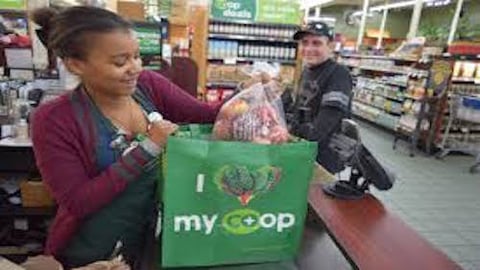Food Co-ops Bolster Communities: Report
According to National Co+op Grocers’ (NCG) “2020 Food Co-op Impact Report,” retail food co-ops persevere in their mission to aid local communities and economies, create markets for area farmers and producers, make nutritious food affordable for more consumers, and care for people and the planet — even during a global pandemic.
The report found that the average food co-op purchases from 185 local farmers and producers, whose products contribute 22% of the co-op’s sales. While co-ops have long been recognized for their support of local food, the report showed how this approach paid dividends at the height of the COVID-19 crisis. In the early days of the pandemic, many grocers that depend mainly on national supply chains had trouble keeping products on their shelves. Conversely, many food co-ops were able to keep items like meat, produce, eggs and milk on their shelves because of solid relationships with local farmers. In fact, in many states, food co-ops increased local food inventories to ensure that farmers had a market for products that would otherwise have gone to waste because of restaurant closures.
The report also called out the value of cooperation when it comes to food affordability. Via NCG, food co-ops combine purchasing power on national brands to offer shoppers lower prices and a wider range of products from which to choose. The Co+op Deals promotion program, for example, saves customers an average of 25% on a selection of 2,000-plus items on sale each month.
Food co-ops are also lowering obstacles to healthy food: Three out of four co-ops across the country now offer a needs-based discount program, a number that has been increasing consistently since 2016.
In the realm of community outreach, co-ops collectively donated more than $7.3 million dollars to community organizations locally in 2020. Additionally, NCG is investing in national organizations working to build a more just and equitable food system. The group’s report lays out how food co-ops are prioritizing racial equity, including the rollout of a supplier diversity program through NCG.
Food co-ops continue to lead the way in sales of organic, Fair Trade, B Corp and cooperatively produced products. For instance, 47% of food co-op sales come from organic products, versus 32% at other natural grocery stores and only 3% at conventional grocers.
While food co-ops work individually to reduce their respective carbon footprints, they also collaborate through NCG to lower the adverse environmental impact of the food supply chain. Since 2012, food co-ops have collaborated with Fair Trade farmer co-ops in Peru to offset a portion of greenhouse-gas emissions related to annual business travel by planting and protecting trees in the Peruvian Amazon. To date, the Co+op Forest program has helped plant and/or protect more than 1.8 million trees.
St. Paul, Minn.-based NCG is a business services cooperative for retail food co-ops located throughout the United States. Its 147 member co-ops operate more than 200 stores in 38 states, with combined annual sales of more than $2.3 billion.






